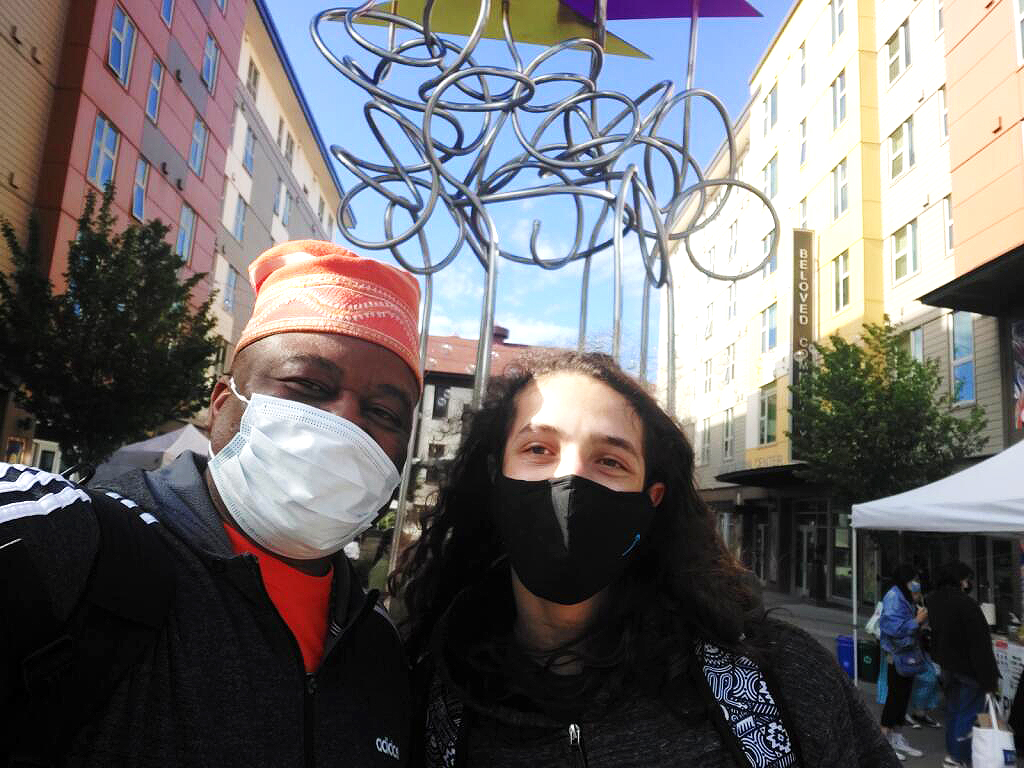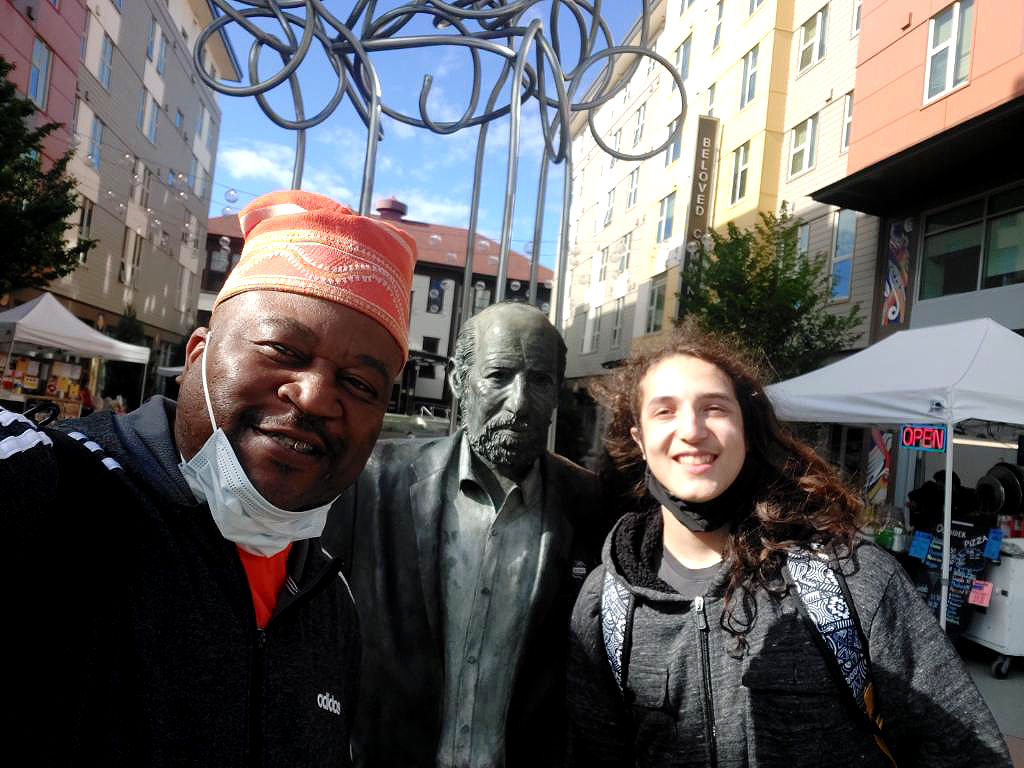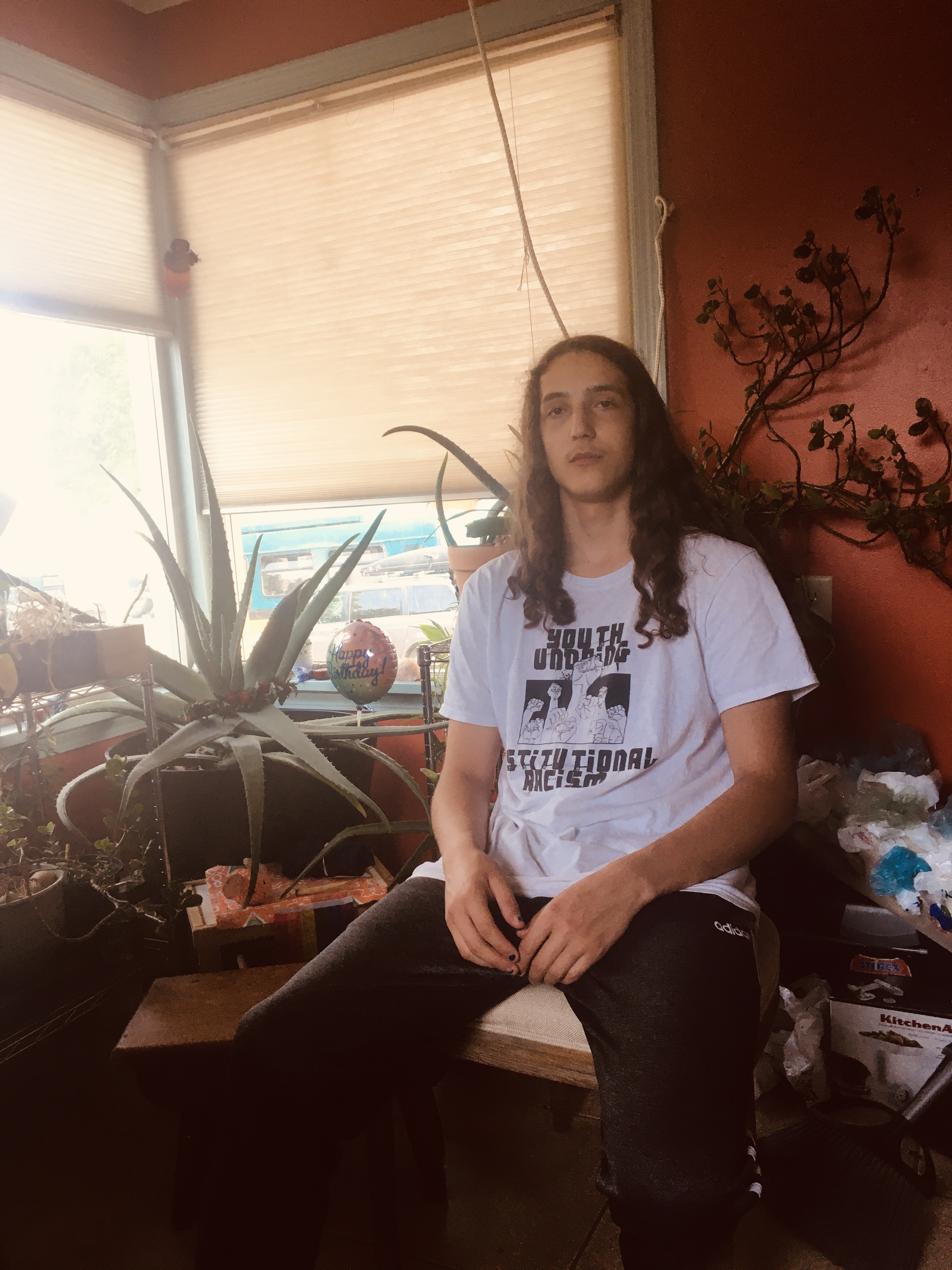Question:
So the last time we talked about music as a language, we were talking about sounding music rather than playing it.
Answer:
That is actually from an experience I had with an artist from Zimbabwe. He was doing a workshop, and so someone had asked him how long he had been playing. Without hesitating he said “I think it’s important to clarify something, and I hope it can provide you with an appreciation to understand that in Africa, where I am from, when we become part of our music with our instruments we don’t use the word play, we use the word sound. Because when we say the word ‘play’, the African language that I speak is such that you have to be really specific about what you say, and has to be done in a way where it’s respectful and consistent, because oftentimes it’s difficult to translate due to the limitations of the English language, other forms of expression can’t really be seen in the same way that they are in the country of origin that’s trying to explain something. So for them, sounding the instrument is what they use, not play, because play equates it with something that was of little importance, something that was in line with a child’s pastime. So playing was not part of their language when it came to expressing themselves or explaining the process of bringing sound out of the instrument, so it sounded, not played”.
I thought that was really interesting, and I got it immediately, cause the thing is that when I sound the drum in my language I always say that music is a universal language and the drum is the primordial messenger. That is to say that even to this day there are areas in West Africa, where the tonal language of the drums is actually able to convey to someone that’s listening exactly what that drum is saying. In other words there is a way that one can communicate efficiently and effectively just by sounding the drum and bringing out the different tone. Because the language itself is tonal in its nature, high, mid, and low, the same can be said about the drums. That is consistent with the Garifuna language and the Garifuna music. The Garifuna music has a variety of different sounds and different tones that are associated with the specific genres within the Garifuna music. The most popular being the Punta music, and it’s probably the most celebrated of the Garifuna music.
Q: I thought it was really interesting the last time we talked about music as a universal language and learning other people’s versions of that language. And it made me think about how when you learn something it can expand on your identity. So my question is how does the music that you learn expand on what you’ve already learned from your Garifuna culture?
A: One of the aspects of the Garifuna artist or musician from my perspective, learning and being a part of it from a very early age, is an appreciation for all music. We had our identity from our Garifuna folkloric music, however there was other music that was part of our experience so for example we had the salsa music, the merengue music, and we had the Rancheros from Mexico. So there’s a variety of different music that was part of the Garifuna experience. So often we would take from each of those forms of expression and we would develop what would later become our own identity within the tradition of our own music. So traditional music eventually evolved through the use of modern instruments because initially we didn’t have the guitar.
We just had our drum, we had the turtle shell, we had the conch shell or the Wadabagei, the maraca which is the Sisira. We were able to take from these different styles of music and later develop it as the Paranda. Paranda is kind of the Blues of the Garifuna people; and in addition to that I was privy to being part of a generation that developed the electric version of the Garifuna music which is called Punta Rock. When I was around 15 years old or so I brought this to the attention of my dad and my uncles, whom I was sounding music with back in the early 70s as a teenager. Back in that time we had Garifuna artists singing merengues and stuff in Garifuna. So what happened was I said “wouldn’t it be a good idea if we put electric guitar and bass guitar into this and use the actual rhythms and the actual drums and create a new sound?”.
And next thing I know somebody in California who was doing a song called “Punta Rock”, which is something that I had also thought about early on in Boston with my dad. The thing with the Garifuna people is that we really respect and appreciate all of these different genres. So for me, when I was growing up, the different expressions of music languages were spoken in specific ways. So if you go to Venezuela and you go to Peru they’re going to have a different swing, they’re going to have their own cadence that speaks to the specific way in which that voice of people musically expresses itself. The Dominican Republic has their merengue, that is sounded in a specific way. The salsa, the Cuban music, they all have these little nuances or specifics. The same way that it is here, if you speak to somebody from the southern region, they have a different way of speaking.
Q: We talked in the beginning a lot about history and the different songs that have come out of that history in the Garifuna culture. So I was wondering if you agreed with the statement that history equals music. In the context of everything else we’ve talked about especially when it comes to hearing other peoples history and being able to play it the way other people have been playing it.
A: That is exactly what it is. As a matter of fact, there are certain regions in West Africa that use music to convey history through the griot. A griot is an African historian whose sole purpose is to carry history from the beginning of beginnings to the present day. A griot is able to go back multi-generations of just one particular family, through songs.
So in essence, a griot could be singing for hours just about the beginning of a particular lineage. They know the history from the great-great-great-great-great grandfather, all the way down to the most recent child being born. So they’re like human history books. And back to your point that is an excellent way of looking at it.
Q: And that’s why every place has a different swing?
A: The different swing is just simply the way that it is expressed, it’s more of a regional thing. However the music with history, that again would probably go back to the time of Africa, from where most of the music came from. With respect to the statement of the griot, we’re talking about history books, and the history books being part of music. Because the griots will sing you their history multi-generations back to the beginning. Back to the language of the music, that’s more of something that’s a form of expression for the individuals depending on what region that they’re from. You have somebody from South America, someone from Central America, you have people from the Caribbean, they just have different ways. And within those regions you have sectional differences as well. And within those regions you have sectional differences as well. For example if you have someone from Mexico, which is so vast, California used to be Mexico, Texas used to be Mexico. And so that would maybe be one region that sung a song or danced a certain way, and another one that would dance very similarly, but they would express themselves in a different way based on the experiences of the region that they lived in.
Q: So a few other questions had a lot to do with Blackness, the MAS Youth Group has a lot to do with connecting with your own Blackness and what that means for everyone, cause that’s such a hard thing to define. So obviously we talked a lot about history, and Blackness is, in a way, a lot about history.
A: Blackness is history because that’s the origin. All the beginnings were from there. And then as we moved further and further away from there. There was an opportunity to attest to our surroundings, and become who we were in those different regions based on the fact that we traveled there. And it changes a little bit, but ultimately, going back to the beginning, Blackness is history, for everyone. For me, having said that, that’s something that I don’t struggle with. And I certainly recognize the uniqueness of my own history. And the fact that when people look at me they immediately assume, just from language and speaking to me, that I’m African-American. And when I clarify I say, “Actually I was born in Honduras, and I am Garifuna. My history is a little bit different”. And having said that, one of the things that I have always found important -more recently than before, because activism is important to me- is recognizing individuality is ok, it matters.
There just comes a time where I seem to be looking at things in a different way. For example, I actually see the person that I see, beyond the carbon suit. I see everything and everything inside you, as the individual that you are, not removing the Blackness but simply compartmentalizing it in a way that it’s understood. However you need to dive deeper and much more in order to extrapolate from there what really is most important. And finding a base to creating that universal truth, which is love. For me everything else is an illusion, I’ve just come to that conclusion through my years, my experiences, through the opportunities that I have had. Meeting all of these great people from around the world, I have just come to the conclusion that the universal truth is love, everything else is an illusion. I’ve learned that emotions are feelings. And I really bought into that, and that my strength comes from my ability to make decisions based on what I know to be the right thing to do, as opposed to simply reacting and responding to an emotion that I can’t control coming through me. I can control how I let it out, I can’t control how it comes in. That’s where the power lies.
So I express my Blackness through my ability to see more than what is. look at things in a deeper way, and I try to make good decisions about how I navigate through this process called life. Blackness is very important but there’s so much more to it. Given the unfortunate transgressions of humankind currently with what’s going on as a result of videographers being able to capture these atrocities that have been going on for millennia. It’s just really important to understand that universal truth, the rest is kinda like bullshit.
We focus on the almighty dollar, I don’t know who created money, but whoever did was a genius. There was a time in Africa when the exchange of services was done in a way that was tangible, it was something. For example, I’ll give you a chicken if you build me a house. Or if you do this I’ll help you fix your home. And somebody came in and decided to monetize, and next thing you know people are living lives where there is so much disparity, so much separation. There’s a certain group of individuals that are going to be in a completely different reality. They’re not building relationships to build their lives. And the reality of it is that if the minimum percentage of the people who have all that wealth pooled their money together, they could eliminate everything that is contrary to what life should be all about. Because I see that although there are people who work to try to create those bridges, the powers that be, whatever they are, won’t allow it to happen. But yeah we move on, I think I mentioned it before, there’s an old adage that speaks to this. About the difficulties of those things that we meet on our journey. And the metaphor that we use is, “How do you eat the head of a rat? Bit by bit”. You gotta do what you can with what you have.
Q: Another question I had has to do with inspiration or drive when it comes to not only creating new sounds but also all the work you do with MAS and the teaching that you do. Where do you get that motivation?
A: I was a founding member of MAS, and I remember when we were discussing it. It was a few years before we even finally got together and did a round robin over at the UW. This was the very first meeting that we had, and I remember that Monica Rojas got a room at the UW. And the first day we met one of the founding participants left his keys inside of the door which was locked. So we all stayed there until we figured out how to get the keys out. t was a testament to what we -from the very beginning- wanted to create in terms of a vision for MAS, which is “In Unity There is Strength” and that we shouldn’t feel like we are alone. And for me when I speak about the evolution of music and where it has taken me to work with all of these different people. I think it began in my childhood with my grandmother in Santa Rosa de Aguan, and my dad who was a musician. So I gained a deep appreciation for all these different sounds because of him, and we sounded all these different genres of music with his group and his brothers group. So it was like a family thing.
Also Babatunde Olatunji, my first formal drum teacher, came from Nigeria, and because he was the first, he sounded with a bunch of greats, jazz pioneers, and jazz influencers from the very beginning. So having those experiences just opened up my world to listening to all these different sounds. And realizing, “You know what? I’m really just a piece of sand or an ant in an anthill. I really need to try to look for ways to hear the music, and hear the different sounds”. And that began my journey with the music. It began my journey with teaching and trying to share as much as I can. I believe that it’s important that you grow by building, and you build by planting seeds. And if we can put organic material into soil and do what’s necessary for it to be healthy and grow, I think it’s important to do that. So that’s what I try to do, I try to provide those seeds, try to be as open as possible in providing them with integrity and information that builds.
I will always do my best and try responding in a way that is going to be able to assist you, for example, being able to take something that you can extend into your relationships as your journey through your life process.
Perhaps in the future it may be you having a conversation where it’s reversed, where you’ll be here and the person that you’re speaking with will be there, and you’re going to be able to go ahead and share what you’ve learned and what you’ve added to it.













